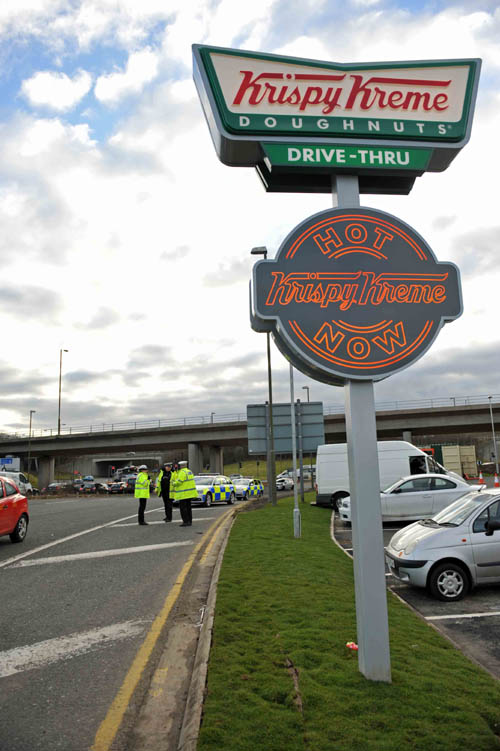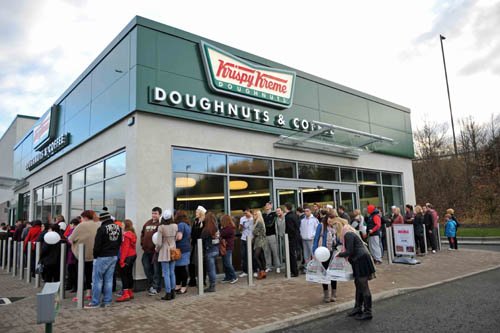AN AMERICAN doughnut chain sold almost five million of the sugary snacks at its first Scottish store in six months.
Sweet-toothed Scots have snapped up doughnuts at the rate of one every three seconds since the Krispy Kreme store opened in Edinburgh in February this year.
The doughnuts contained an estimated 1.5bn calories and health campaigners yesterday described the extent of sales as “truly alarming”.

The opening of the store on the western outskirts of Edinburgh caused massive jams on the M8 and city bypass and police had to be drafted in to control traffic.
Asked for details of its sales in the first six months, the company admitted it had shifted 404,000 dozen boxes of doughnuts and 122,000 “singles”.
That adds up to 4,970,000 doughnuts – almost enough for every man, woman and child north of the border.
Products range from the relatively slimline Original Glazed containing 200 calories to the Cookies and Kreme which contains 400 calories. Based on the average, the doughnut sales mean Scots took on an estimated 1,495,970,000 calories.

Tam Fry, spokesman for the National Obesity Forum and chairman of the Child Growth Foundation, said: “I can understand that Krispy Kreme don’t have a responsibility to the NHS, they’re there to make money, but these figures show that something needs to be done.
“It’s really terrible. It’s ruinous and excessive and is damaging people’s health in ways they never imagine, they don’t realise the consequences.”
He added: “The government is already acting upon the problem of obesity and have carried out extensive research into high calorie foods but I think that outlets such as Krispy Kreme, should cap the level of sugar they use and if they exceed it they should be fined.
“I mean one of the doughnuts which weighs 90 grams has 24 grams of sugar alone. It’s shocking.”
Nutritionist, Dr Chris Fenn, said: “Those figures are absolutely shocking and create real concern for Scottish people’s health.

“The important thing we have to remember is that it’s not just a calorie thing – it’s the type of calorie.
“The increased insulin levels that come about as a result of a high blood sugar level mean that any food eaten after the initial sugar rush is turned straight into fat.”
Dr Fenn added: “Krispy Kreme’s marketing has obviously been very successful and they’ve used their popularity in America to help make it bigger over here. It’s trendy and fashionable and people want to be involved.
“They may well advertise how many calories are in their foods but they’re not advising on the harmful effects refined sugar can have.”

A spokeswoman for World Cancer Research Fund said: “Having a diet that features a lot of energy-dense foods that are high in added sugar or fat, such as doughnuts, increases the chances of becoming overweight or obese which, in turn, increases the risk of getting cancer.”
But Krispy Kreme strongly defended its operation, saying there was nothing wrong with an occasional treat and that average customers only visited six times a year.
Judith Denby, chief marketing officer at Krispy Kreme UK, said: “As a brand, Krispy Kreme is all about occasional treats and that is how we position our products to customers.
“On average customers visit once every other month. Nutritional information on all products is available in-store and on our website to help inform customers’ choices.”
